Interview: Cyril Ramaphosa on how to fix South Africa

Roula Khalaf, Editor of the FT, selects her favourite stories in this weekly newsletter.
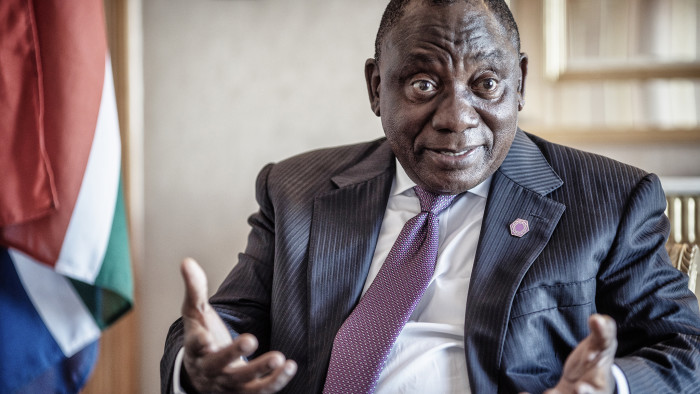
For the four years of his vice-presidency, Cyril Ramaphosa looked on with seeming impotence as his boss dragged South Africa closer to catastrophe. While Mr Ramaphosa stood silently, Jacob Zuma axed competent ministers and ransacked state institutions in the interests of his alleged paymasters, the Gupta family.
Little in Mr Ramaphosa’s reticence during that period could have prepared South Africans for what was to follow. In the three months since he was elected leader of the African National Congress, he has unleashed a political blitzkrieg, making a succession of decisions and deft manoeuvres that have bolstered investor confidence and lifted the national mood.
Why did he wait so long? “What did Shakespeare say?” he replies in an interview with the Financial Times in London, before quoting Brutus’s call to action in Julius Caesar.
Seemingly in his element at the start of what might be described as the third act of a career that has spanned ANC activist, businessman and now president of the nation, he adds: “‘There is a tide in the affairs of men.’ That quotation kept ringing in my head because many people kept asking: ‘Why are you not acting? Why are you not saying anything.’ And I kept saying: ‘There’s a time when one needs to act and, when you do take action, it should be such that you do not fail.’”
The tipping point, says Mr Ramaphosa, 65, came in March 2017 when Mr Zuma sacked Pravin Gordhan, a close associate whose history of activism and technical abilities command huge respect. Mr Gordhan, now restored to the cabinet to knock sense into the country’s corruption-riddled public enterprises, was fired after publication of a report cooked up to discredit him.
On ousting Jacob Zuma
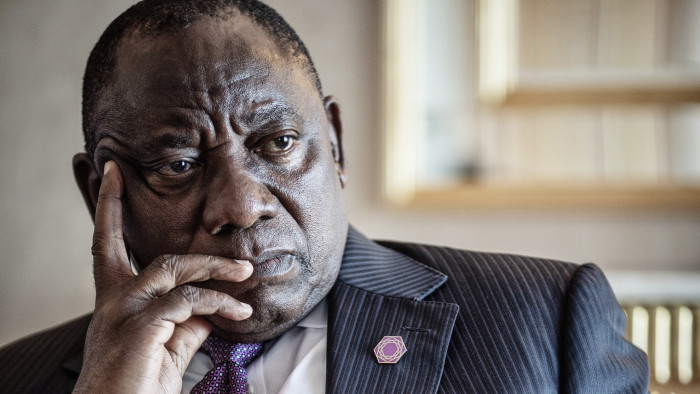
“We saw that something was wrong, horribly wrong,” Mr Ramaphosa says of that period. “When we were hitting rock bottom, we needed to say something so that we could begin to recover and claw our way back.”
Mr Ramaphosa has proved more patient than Brutus. His wait for the top job goes back to the mid-1990s when Nelson Mandela expressed his wish, soon after the end of apartheid, that the gifted lawyer should succeed him. But the ANC leadership thought otherwise. Mr Ramaphosa, the party’s chief negotiator with the Nationalist government at the end of apartheid, was overlooked.
After losing the leadership battle to Thabo Mbeki, in 1996 he turned to the private sector where he quickly amassed a fortune, benefiting from shareholdings and board positions bestowed as part of the black empowerment mechanism he had helped devise.
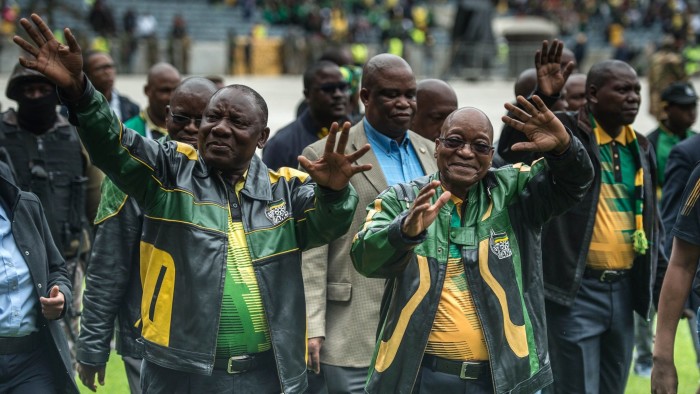
The country he has taken over is very different from the one that would have awaited him in 1999 on Mandela’s retirement. Then there was still a sense of optimism and a willingness by the black majority to wait for the ANC to right the wrongs of apartheid. Two decades later and after 10 years of Mr Zuma’s corrosive presidency, patience has run out.
“That’s the past. We must now look to the future,” says Mr Ramaphosa, acknowledging that he must both reassure investors that South Africa is open again for business as well as addressing those unhealed wounds.
During Mr Zuma’s term, the economy stalled, the rand slid and two rating agencies marked down the sovereign debt to junk. The once seemingly unassailable electoral majority of the mighty ANC evaporated as the party lost control of three big cities, including Johannesburg, in 2016 municipal elections.
Unemployment is chronic, especially among the young. The predations of apartheid are still there for all to see, in the distribution of land and wealth and in the spatial segregation of cities. Julius Malema, who broke away from the ANC to form the radical Economic Freedom Fighters, has captured the mood of public anger among black voters fed up with the ANC’s seeming inability to create jobs, provide services or improve lives.
On reviving the economy
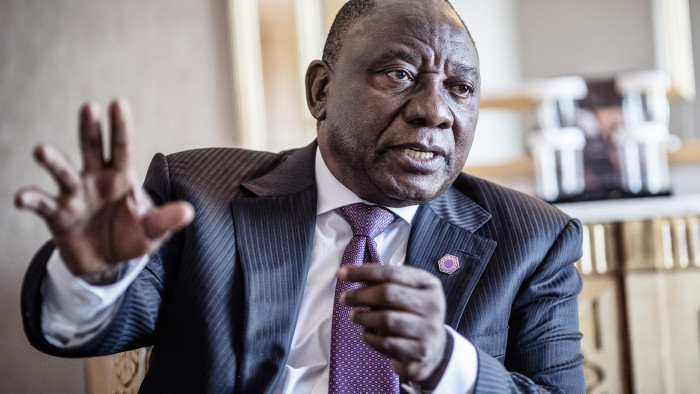
If the problems are enormous, Mr Ramaphosa has moved to address them with a speed belied by his earlier inaction. In the short time since he was elected leader of the ANC, he has shouldered Mr Zuma aside as state president; swept out the management of dysfunctional state-owned enterprises; purged a cabinet loaded with Gupta family acolytes; and emboldened a previously cowed law-enforcement apparatus.
Mr Zuma, who had resisted corruption charges for years, has been summoned to court. A probe has been launched against the Gupta family, who stand accused of influencing state appointments and government tenders through Mr Zuma. The Gupta family and Mr Zuma deny any wrongdoing.
Mr Ramaphosa has even transformed his own image, jettisoning the aloof lover of fine wines for the man of action who flies economy class and greets ordinary voters on his morning run.
The sense of urgency owes largely to Mr Ramaphosa’s lack of time to turn sentiment around. In 2019, he must face the electorate as head of a divided party, one that elected him as its leader in December by the narrowest of margins. Zuma loyalists remain in positions of power. David Mabuza, who as premier of Mpumalanga was accused of treating the province like a personal fiefdom, is deputy president. The ANC’s top six officials are divided between those seen as “constitutionalists” in the Ramaphosa mould and those, like Ace Magashule, secretary-general of the party, who advance a style of politics based on connections. Few doubt there will be a showdown ahead.
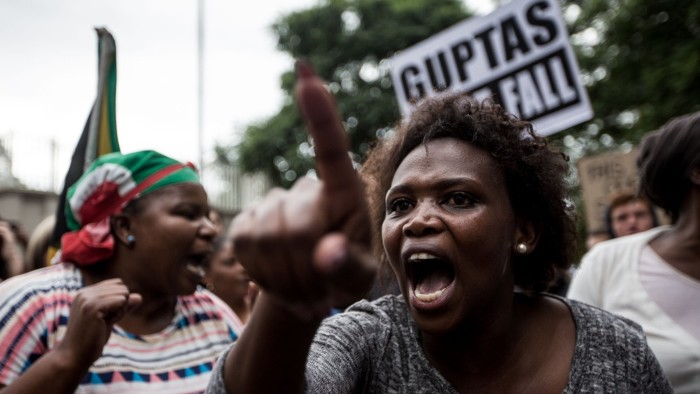
As if to underline the looming battle, Mr Ramaphosa was forced to cut short his London trip to handle violent unrest triggered by party infighting in Mafikeng, a northwestern city, over the fate of another Zuma-allied provincial baron who is accused of massive graft. “People are going to start feeling betrayed” if such politicians are not removed — but neither can Mr Ramaphosa make too many enemies in the Zuma camp, says Ralph Mathekga, a political analyst.
Mr Ramaphosa has moved swiftly to consolidate power. He has made 21 changes to a cabinet of 36, and reappointed people sacked by Mr Zuma. Asked how he will tackle corruption within the ANC, he lays emphasis on the courts and a commission of inquiry into the “state capture” through which Mr Zuma, in collaboration with the Guptas, is alleged to have compromised the country’s institutions.
“There will be leaders, people within the ANC who will be caught up in the web of state capture,” Mr Ramaphosa says. “And when they are, they must be accountable . . . It will ferret a lot of things out.”
Sithembile Mbete, a political analyst, says the president’s strategy is to leave much of the dirty work to the courts, which are reviewing the propriety of several of Mr Zuma’s top police and prosecutorial appointments. That approach would help pre-empt any accusation that the president is using investigations to rid himself of enemies and Zuma faithfuls.
“Ramaphosa does not want to be accused of that, especially by Zuma who is hoping to mobilise his victimhood as a political force,” Ms Mbete says.
He has two other monumental tasks. First is to get the economy moving again. His appointment halted the decline in the rand and persuaded Moody’s, the only big agency not to have downgraded South Africa’s sovereign debt to junk, to change its outlook to stable. Now he wants to get investment, currently below 20 per cent of gross domestic product, flowing.
The president says he will approach the investment question like a businessman, “building a book” of at least $100bn in projects, both domestic and international. He wants firm pledges by the end of the year. The private sector has told him, “give us more confidence and we will invest”, he says. “Give us more reason why we should invest in various sectors of the economy and we will.”
On land reform
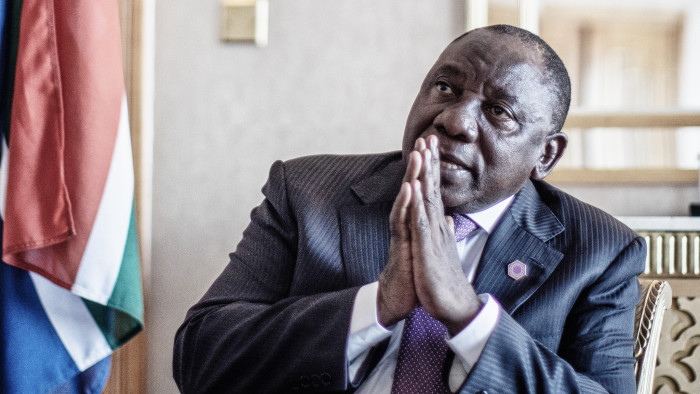
Mr Ramaphosa insists he can provide the policy stability investors need. “We can explain where we are. We can explain what we are seeking to do is to create a very good and solid and durable environment for investment,” he says.
Some of the money — as much as $40bn — will come, he says, from state-owned enterprises, an additional amount from Chinese investors and the rest from the private sector, both domestic and foreign. “I am truly excited about this,” he says of his “investment-hunting” strategy.
“I’m approaching this with a private sector lens,” he says, adding that he envisages investment in infrastructure, tourism — which “stands out as one of the bigger job creators in our economy” — and manufacturing. “Our industrial base has shrunk quite a lot over the years, [but] we can boost that.”
Rating agencies say the economy, buoyed by Mr Ramaphosa’s first three months, could grow 2 per cent this year, nearly double what had been expected. People around the president talk of lifting growth in GDP to 3 or 4 per cent by the end of his first term.
That would be a good start, but Mr Ramaphosa knows it will not be enough. The bigger challenge will be to address some of the structural legacies of apartheid that were exacerbated by the low growth and moral decay of the Zuma era. More, he must answer the demands of a frustrated majority — through redistribution and black empowerment — without spooking investors.
A third act: Life and times of an activist, businessman and president
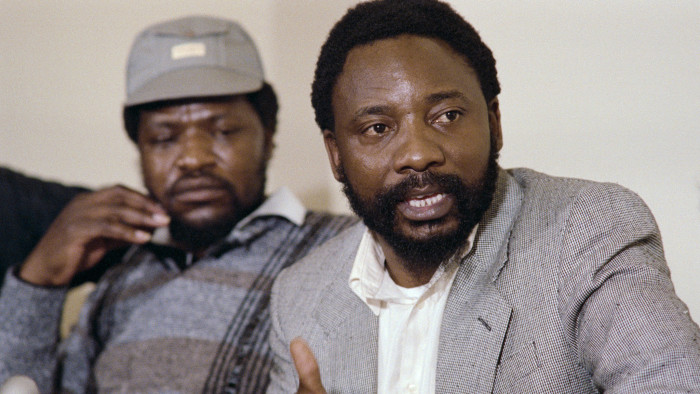
November 17 1952
Born in Johannesburg’s Soweto township to a former policeman and domestic worker. The family move to Chiawelo, also in Soweto, in 1962
1972-76
Studies law rising up through the ranks of anti-apartheid activism — and is detained by the white minority regime twice, including 11 months of solitary confinement
1982
Instrumental in founding the National Union of Mineworkers and making it a core part of the anti-apartheid struggle while many ANC leaders are in prison or exile
1987
Leads NUM during one of the biggest strikes in South Africa’s history
1990
As apartheid crumbles, he chairs the reception committee for high-profile ANC prisoners being released from jail, including Nelson Mandela, and is elected secretary-general of the party
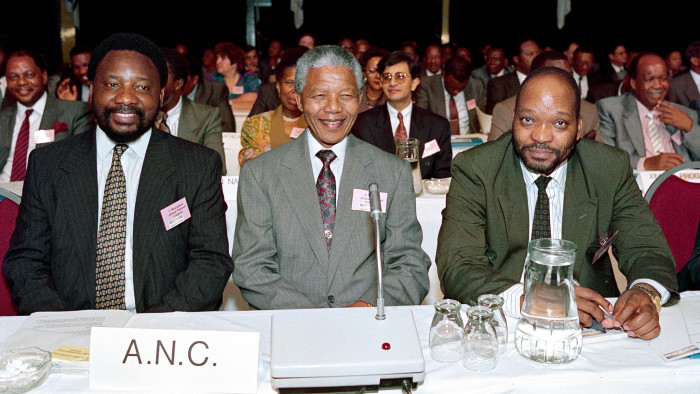
1991-94
Heads the ANC negotiating team in talks that end apartheid rule and prepare South Africa for a democratic era
1996-97
After South Africa’s new constitution is adopted — and he is passed over as Mr Mandela’s successor — he leaves active politics for business, accumulating investments and executive roles in banking, telecoms and other industries.
2012
Massacre at Marikana of striking mineworkers employed by Lonmin, where Ramaphosa is non-executive director.
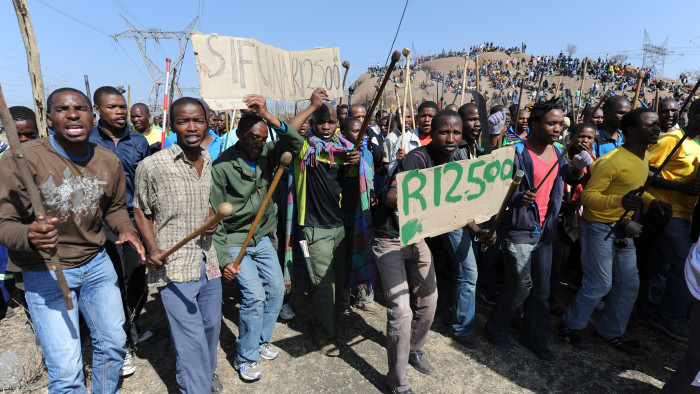
Elected deputy president of the ANC
2014
Appointed by Jacob Zuma as deputy state president
2015
Cleared by a commission of inquiry of responsibility for the Marikana massacre
2017
Elected president of the ANC by a margin of 179 votes out of a total of over 5,000
February 15 2018
Inaugurated as South Africa’s fifth post-apartheid president, a day after Mr Zuma resigns under ANC pressure
Although Mr Zuma did virtually nothing for ordinary South Africans, he happily gave voice to populist rhetoric. Mr Ramaphosa, the multi-millionaire still blamed by some for the 2012 shooting of miners at Marikana when he was on the board of Lonmin, will not simply be able to brush talk of radical solutions aside. He has a task, viewed as impossible by some commentators, of simultaneously making the country more “capitalist” so that it can grow faster, and more “socialist” so that more wealth and opportunity is distributed to a disenchanted black majority.
One issue that has come back to haunt the ANC is land, described by Mr Ramaphosa as the “rock bed” of the ANC movement since its formation in 1912. “It was formed to resist the land grab by the colonialists, to return the land that had been taken by the wars of dispossession,” he says. “The clamour for land has come back full force,” he says, describing the yearning for land as a “gaping and bleeding” wound.
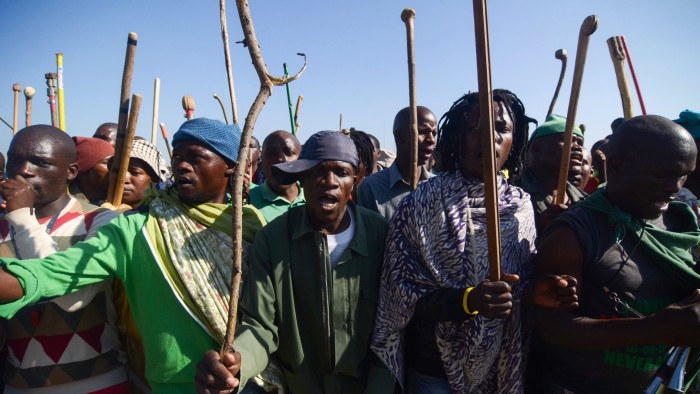
Under pressure from Mr Malema, the firebrand leader of the EFF, Mr Ramaphosa has agreed to a review of the constitution that would make it easier to expropriate land without compensation. But in the interview he makes clear that he favours practical solutions, such as distributing land already owned by the state and awarding abandoned buildings to tenants. That approach would balance the need for social justice with the preservation of property rights.
“We are not going to go for solutions that will lead to a decline in the economy,” he says. “Whatever we do as we return land to indigenous owners, the economy must not be harmed, agricultural production must not go down.” But as a sign of how far Mr Ramaphosa is prepared to lean to accommodate different views and head off opposition from the left, he says he would gladly welcome Mr Malema back into the ANC. “This is his ideological home,” he says.
All Mr Ramaphosa’s negotiating skills will also be required in working out a new mining charter. Here the push for more black empowerment could potentially lead to rules that expose foreign mining companies to the constant threat of shareholder dilution, or even outright expropriation. But the president, who once led striking miners in the fight against apartheid, sees the possibility for a compromise that would satisfy both investors and broader stakeholders.
On cleaning up the ANC
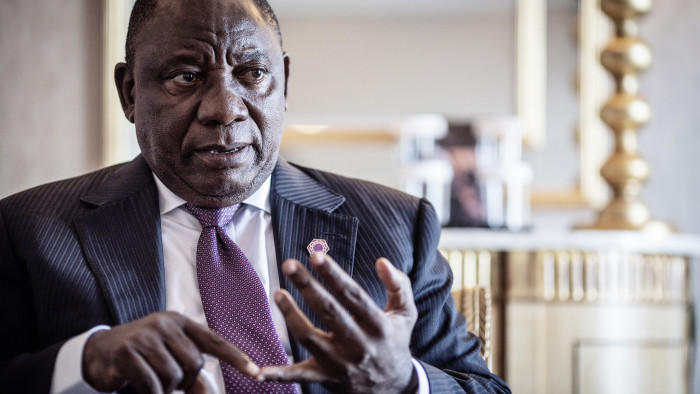
“This is almost a global trend now,” he says. “You must have inclusive growth. You can’t make profits out of a community; you must make profits with the community.” He recalls an arrangement he helped negotiate when he was chairman of Mondi, the paper group, through which those who lived around the paper mill benefited economically from the land on which they were living. “Let’s find a win-win solution,” he says.
Less than three months into the job, the president, 20 years in the making, describes his role as tackling injustice now “to ensure there are no policy mishaps”, or social explosions, in future.
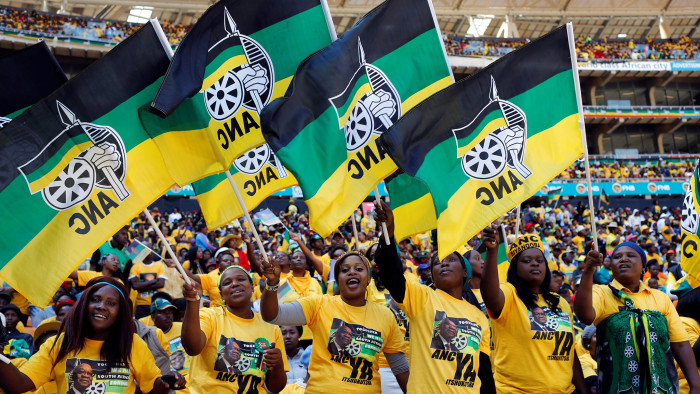
In the years since Mandela first put Mr Ramaphosa’s name forward as a future president, the ANC has lost much goodwill and South Africa much ground.
For the moment, the president’s obvious contrast with Mr Zuma has been enough to inject South Africans with a feelgood factor they are calling “Ramaphoria”. The mood change is palpable. But it will not last for ever.
Additional reporting by Andrew England
‘The clamour for land has come back full force’
If the clamour for land in South Africa will test all Cyril Ramaphosa’s negotiating skills, the president already has a working template from his business days: an agreement struck by Mondi, the paper company he joint-chaired, with land claimants in the province of KwaZulu-Natal.
As Mr Ramaphosa tells it, Mondi faced a problem because a local community was claiming to be the rightful owner of 300 hectares of land on which the company had planted trees. Protesters had started burning trees and threatened to engulf the whole forest if Mondi did not return the land.
The government lacked funds to compensate Mondi, so the company asked for an IOU from the state. It then struck an agreement with the community to return the land but to retain ownership of the trees it had planted.
“We said: ‘The land is yours. We will pay you rental for utilising the land. When we come to harvest the trees, we will pay you,” Mr Ramaphosa recalls. In addition, he says, Mondi agreed to train young people in forestry and to send them to college or university. It helped build homes. Once the trees were harvested, it encouraged the community to plant trees again and sell them to the mill. Mr Ramaphosa says the chief executive of Mondi last week proposed extending the scheme.
He also talked approvingly of Herman Mashaba, the mayor of Johannesburg from the opposition Democratic Alliance party. Mr Mashaba, he says, has gone around the city looking for derelict buildings. “He is taking those buildings, no compensation. He’s going to spruce them up and make them available for communal housing.”
Comments